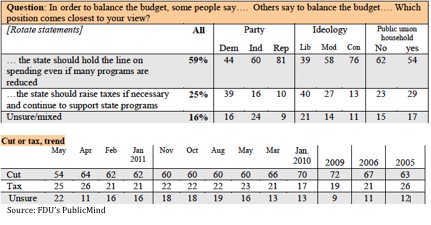
He's the phenom from an unlikely state, a state associated with turnpike exits, refineries, high taxes, high prices and, on a good day, with New York City, the New York Giants and Jets, and Jersey Shore (the TV show, not the real thing). And yet a portly, Republican governor in that Democratic-leaning state has maintained good approval ratings, despite high unemployment, high taxes, high anxiety, and substantial budget cuts. More remarkably, he became a nationally known figure, a sought-after Republican fund-raiser, and a YouTube sensation. The only way to explain his success is to know his dirty little secrets.
Secret number one is his particular brand of conservatism. Christie sticks like glue to the one story line that both New Jersey and national voters have been sure to share: fiscal conservatism. He reels off story after story of the Garden State's alternative universe of fiscal abuses, from six-figure payouts for unused sick days to sitting senators collecting three checks from sinecures. His audiences at fundraisers everywhere are entertained and affirming. Wandering into social issues is not part of the plan. He avoids any discussion of gun rights, abortion, or same-sex marriage no matter how many times the press corps, or his opponents push him. Offered the culture war litmus test of creationism vs. evolution, he responded, "That's none of your business."
Christie's election in 2009 was made possible largely by the fiscal shenanigans of his many predecessors and in part by the 2008 fiscal failure of one of New Jersey's favorite employers: Wall Street. Christie beat the hapless Jon Corzine, a former chief of Wall Street's Goldman Sachs in 2009 who, when elected governor in 2005, had promised to set Jersey's finances straight but instead came up with a scheme to raffle-off the Turnpike and let the state's preponderant commuters choke on ever-increasing tolls imposed by a private firm -- quite possibly even a "foreign" one.
Thus Christie's arrival in the statehouse was perfectly timed to the mood of an exhausted electorate whose property values had plummeted but whose property taxes were still climbing, whose urban schools had been force-fed billions of dollars to close the education gap but were making no progress even when significantly outspending suburban schools, whose governor had dropped in from Wall Street, bearded, be-spectacled and be-sweatered, unable to deal with the Byzantine alliances or public enemies who invade Trenton by day, and then leaving, conspire by night at fundraisers, rising each morning to reconvene in diners before the high sun draws them again to the gleaming gold dome reflecting over the crime-infested capitol. Christie had run for sheriff, and won.
If one polling question encapsulated the public mood, it was the one asking whether voters would prefer to "hold the line on taxes, even if it means cutting important state programs" or to "raise taxes if necessary," in order to continue to support important state programs. Three of five voters consistently wanted to "hold the line on spending." Just one in five wanted to raise taxes, while another one in five wanted to eat cake and have it too.

So when Sheriff Christie came to town, the public mood was just right for him. At the time of his inauguration in January 2010, 70 percent said they preferred cuts to 17 percent who said tax increases were needed. Headed into 2012, three in five continued to say "hold the line" on spending compared to one in four who said it was time to raise taxes. In favor of holding back spending, even if it meant cutting programs, were a plurality of Democrats (44 percent), as well as a clear majority of independents (60 percent), and that broad middle of moderates by two-to-one (58 percent - 27 percent) agreed. Good Lord. Even voters in public employee households preferred cuts over more taxes -- despite that many cuts would come at their expense.
Christie's message on this point was aided by a continuing litany of wasteful spending: office-holders double-dipping into pension funds, toll collectors pulling down six-figures a year, a sewage commission staffed through nepotism, school superintendents making more in salary than the governor and one getting free school lunches for her kids. Christie jumped on each news story, using it as further evidence that the legislature couldn't be trusted with taxpayer's money. With no one trying to defend the indefensible, Christie's had an appreciative audience to himself.
Thus, did Christie seize on the zeitgeist of the day, and respond to it in ways that his self-financed, self-aggrandized, Wall Street predecessor could not, or at least did not. When the mood will change is anyone's guess, but in the meantime the Democratic Party majority in both legislative houses can read polls. Many want reform too, or at least restraint. But partisans being partisans, a large part of their task is to paint Christie into a budget box from which he cannot escape, or failing that to push him outside his conservative comfort zone on the fiscal high ground into the quagmire of social and foreign policy.
Dan Cassino and Peter J. Woolley are professors of political science at Fairleigh Dickinson University in Madison, New Jersey. Cassino is Director of Experimental Research for the University's research group, PublicMind: Woolley is its founding Executive Director. This is the first in a series on Chris Christie.